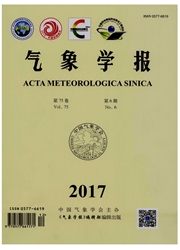

 中文摘要:
中文摘要:
利用成像速率为2000幅/s的高速摄像资料,对采用不同触发方式的两次负极性闪电进行了对比分析,结果表明:空中触发方式的上行正先导的起始速度比经典触发方式的低一个量级左右,而前者的触发高度要比后者的高;闪电通道中金属导线汽化部分的余晖时间可达160—170 ms,相对来说,空气离化部分的亮度信息更能真实体现闪电通道中的电流特性。依据闪电通道亮度变化特性的差异,并结合电场变化的观测,可以将回击之后的过程分为3种类型,没有M分量的为连续衰减型,有M分量的可分为独立型和延续型两种,能够与不同类型的延续电流波形相对应。总体上看,有M分量的回击间隔比没有M分量的要长,几何平均值分别为77 ms和37 ms,有M分量的初始连续电流也会比没有M分量的持续更长的时间。回击和M分量发生前闪电通道的相对亮度存在明显的差异,回击前闪电通道的相对亮度很弱,甚至观测不到任何发光现象,而M分量发生前闪电通道仍有较强的发光。
 英文摘要:
英文摘要:
The comparison is made between the high-speed (2000 fps) photographic data in rocket-triggered negative lightning using two techniques. The analysis shows that: the initial speed of upward positive leader (UPL) in altitude-triggered negative lightning (ATNL) is about one order of magnitude lower than that in classical-triggered negative lightning (CTNL), while the triggering height of ATNL is higher than that of CTNL; the afterglow time of metal-vaporized part of the lightning channel can endure for about 160 - 170 ms, so the luminosity of the air-ionized part can reflect the characteristics of the current in the lightning channel better than that of the metal-vaporized part. According to the different characteristics of the luminosity change of the lightning channel, together with the observation of the electric field chang can be distinguished: the continuous decaying type without es, three kinds of processes after return-stroke (RS) M component, the isolated type and continuing type with M component, corresponding to different wave shapes of the continuous current. The geometric mean of the interval of RS with M component is 77 ms, than that (37 ms) of RS without M component. And the initial continuous current (ICC) with M component also has a longer duration than does the ICC without M component. The distinction between the relative luminosity of the lightning channel before RS and that before M component is obvious: the former is very weak or even can' t be observed, while the latter is still considerable luminous.
 同期刊论文项目
同期刊论文项目
 同项目期刊论文
同项目期刊论文
 期刊信息
期刊信息
